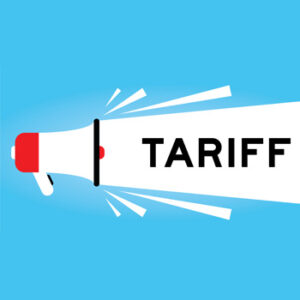Stocks began the month on a steep downward trajectory, experiencing losses reminiscent of the early pandemic lockdowns. However, by the end of the month, shares had managed to erase most of the early losses.
What happened?
Two primary events dominated the conversation during the month. First, the imposition of ‘reciprocal tariffs on April 2, and second, the president’s threat to fire Fed chief Jerome Powell one year before his term expires.
Referred to as “Liberation Day,” President Trump unveiled tariffs that far exceeded investor expectations. As reported by Bloomberg, these tariffs marked the highest levels imposed in more than a century.
While the tariffs may simply serve as a negotiating tactic, the resulting two-day selloff wiped 10.5% off the S&P 500 Index, according to MarketWatch data. This significant drop underscored investor worries that the U.S. economy might be in danger of entering a recession.
It was the perfect storm: falling stock prices, falling bond prices, and a lower dollar brought on by fears that extremely high barriers to trade could raise inflation, disrupt global trade, and possibly lead to a recession.
The adverse response in the financial market prompted the president to postpone reciprocal tariffs for 90 days, as he aimed to negotiate new trade agreements. He subsequently stated that he is willing to consider extending the initial delay.
According to Bloomberg News, the delay fueled the third-largest daily increase in the S&P 500 Index since the end of World War II.
Is the Fed Politicized?
Trump has never been shy about expressing his displeasure with Fed chief Powell. On various occasions, he has publicly pushed Powell to reduce the fed funds rate. It’s not as if prior presidents haven’t pressured the Fed on rates, as former Fed Chair Alan Greenspan said in a 2018 CNBC interview, but it is usually done behind closed doors.
Why do U.S. and global investors prize an independent Federal Reserve?
Although the Fed does not operate in a political vacuum, “A politicized central bank opens the door to higher inflation, higher interest rates (bond yields), and a loss of confidence in the American financial system,” Morningstar said in a late-April analysis. “If the U.S. financial and political system is perceived as unstable, foreign investors may demand a higher return on their money to compensate for those risks,” the firm added.
In addition, many investors fear that a highly politicized Fed would maintain a low fed funds rate, which they worry could lead to a lasting rise in inflation and elevated bond yields. This concern is not limited to just one political party.
With the exception of China, the worst of the tariffs are on hold investors cautiously nibbled on beaten-down stocks, erasing most of April’s early losses.
Bottom line
First quarter earnings have been exceeding expectations, according to research done by Dr. Lyle Bowlin on our team, who has listened to over 100 earnings calls this quarter. Coupled with the president’s lighter approach to trade and easing of China trade tensions, markets calmed considerably by the end of April.
Yet, a weak first-quarter Gross Domestic Product suggests the economy is slowing, and the possibility of a recession cannot be discounted.
When market volatility increases, we continue to suggest the approaches we have discussed in the past. Keep your investments diversified, be aware of your risk tolerance during market downturns, concentrate on your long-term objectives, and refrain from making decisions based solely on the unavoidable fluctuations in market activity.
If you have any concerns or would simply like to talk, please contact me or any team member. Thank you for choosing us as your financial advisor. We are honored and humbled by your trust.
May 2025
The opinions voiced in this material are for general information only and are not intended to provide specific advice or recommendations for any individual. All performance referenced is historical and is no guarantee of future results. All indices are unmanaged and may not be invested into directly. There is no guarantee that a diversified portfolio will enhance overall returns or outperform a non-diversified portfolio. Diversification does not protect against market risk.

